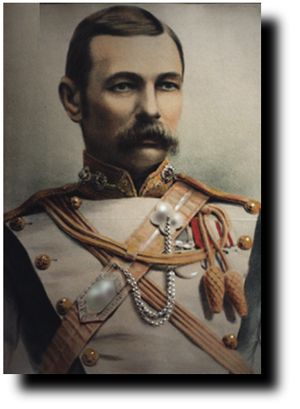|
|

 |
| D.C. Drury-Lowe figures large in the folklore of the 17th. He was a very popular Colonel and commanded the regiment at the Battle of Ulundi, one of their most famous actions. He commanded the regiment through 12 years while they were stationed in England and Ireland, and retired in August 1878. He was succeeded by Thomas Gonne. Then something odd happened when you bear in mind that Drury Lowe was very popular. The 17th were ordered to embark for South Africa after the defeat of one of Lord Chelmford's columns at Isandlhwana. J.W. Fortesque, in his History of the 17th Lancers says: In the short interval between the warning and the embarkation, the Commanding Officer, Colonel Gonne, was accidentally shot while superintending the practice of the non-commisioned officers with the newly issued revolver, and so severely wounded as to be unable to proceed on active service. Accordingly, on the 22nd February, Colonel Drury Lowe was gazetted as supernumerary Lieutenant-Colonel, and reassumed command of the regiment, his return being joyfully welcomed by all ranks, without exception, from the second in command downwards. Unfortunately, he was wounded at the start of the 17th's charge of the Zulus at Ulundi and retired once more soon afterwards. He had joined the regiment as a Lieutenant in June 1855, eight months after the Battle of Balaclava, but in time for the battle of Tchernaya in August. He served in India 1858-59. Under Sir Evlelyn Wood, He commanded the Cavalry Brigade in the Boer War of 1881. Following this, Drury Lowe achieved fame in the Egyptian War of 1882. He was again in command of the cavalry, and after the battle of Tel-el-Kebir led his troops on a forced march on Cairo where Chief Arabi surrendered to him, earning him the thanks of both houses of Pariament and the KCB. |
| Additional Picture of Drury-Lowe |
| Lieutenant-Colonels | Regimental details |
Armed Forces | Art and Culture | Articles | Biographies | Colonies | Discussion | Glossary | Home | Library | Links | Map Room | Sources and Media | Science and Technology | Search | Student Zone | Timelines | TV & Film | Wargames
